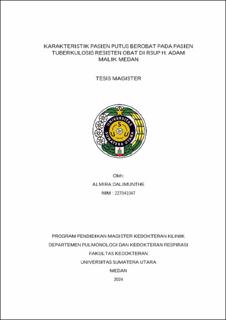| dc.description.abstract | Background : Tuberculosis (TB) is an infectious disease caused by the bacteria Mycobacterium tuberculosis. Progress in TB treatment has given rise to a new problem, namely drug-resistant tuberculosis (DR TB). The characteristics of patients who drop out of treatment are very diverse, including social, clinical and economic characteristics. Non-compliance with treatment is an important concern in the management of infectious diseases, especially in making public health policies as a strategy to eradicate TB.
Objective: To determine the characteristics of DR pulmonary TB patients at H.Adam Malik General Hospital Medan who loss to follow up treatment.
Methods: This research is a descriptive analytical study using a cross sectional approach. Carried out at H.Adam Malik General Hospital, Medan, on DR TB patients who had been diagnosed bacteriologically and who met the inclusion and exclusion criteria. This research uses data from medical records and questionnaires. The independent variables consist of gender, age, education level, occupation, marital status, family history of having had TB, attitudes towards TB treatment, social support, and health care services.
Result: Of the 34 samples who were DR pulmonary TB patients who loss to follow up treatment, most of them were patients in the age range of 45-65 years (n=17.50%), male (n=19,55.9%) high school education level or equivalent (n=21, 61.8%) had permanent job (n=17, 50%), marital status (n=24, 70.6%), no family history of pulmonary TB (n=32, 94.1%), poor attitude towards TB treatment (n= 23, 67.6%), received moderate social support (n=16, 47.1%), and received moderately supportive health care services (n=22,64.7%). The reasons why DR TB patients dropped out of treatment obtained from this research include side effects of TB drugs, difficulties when taking monthly medication, feeling healthy after the effects of ATT, patients moving from place to place of residence, feeling that there is no change after taking ATT, feeling bored taking long-term ATT, and feelings of depression and anxiety when taking ATT.
Conclusion: The majority of drug-resistant pulmonary TB patients who have loss to follow up of treatment at H. Adam Malik General Hospital have an age range of 46-65 years, male gender, high school graduates or equivalent, have a permanent job, are married, have no family history of pulmonary TB, and have poor attitudes. towards TB treatment, receiving moderate social support, and receiving adequate supportive health care services. The reasons for loss to follow up treatment for DR TB patients are varied, from side effects of the drug, difficulty taking the drug, the patient changing their place of residence and the patient being bored, feeling that there is no change and being anxious when taking ATT. | en_US |


